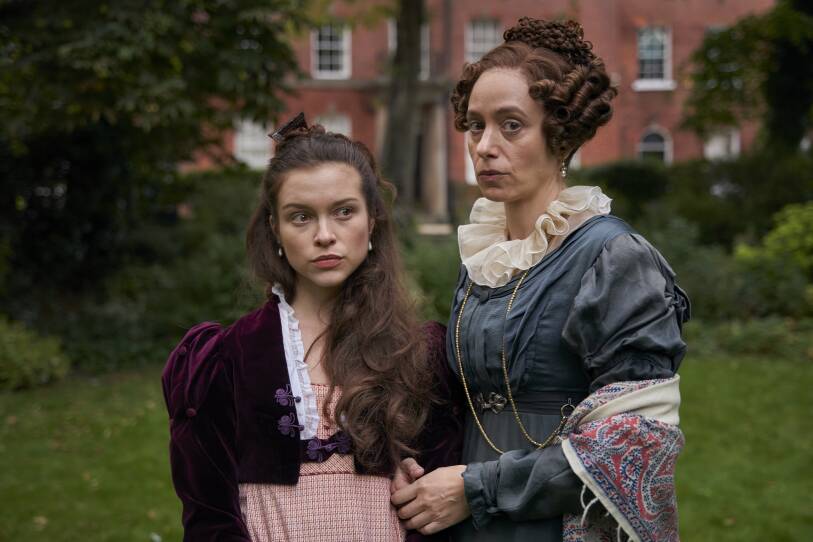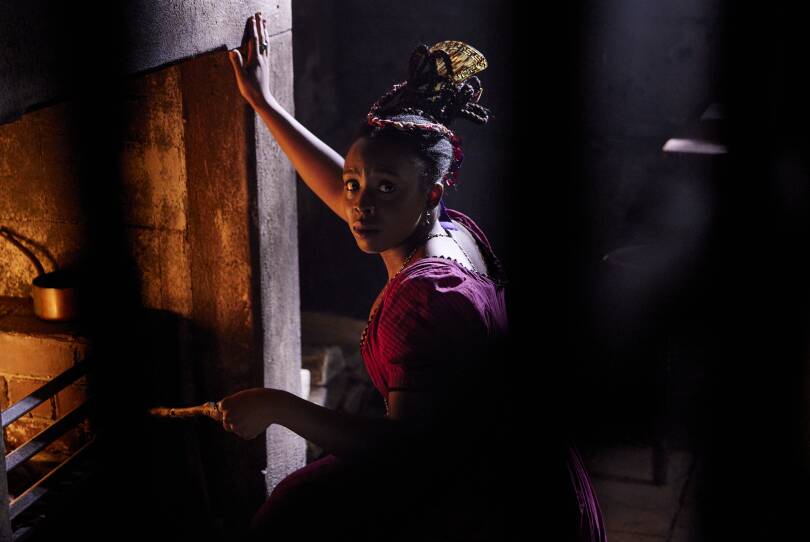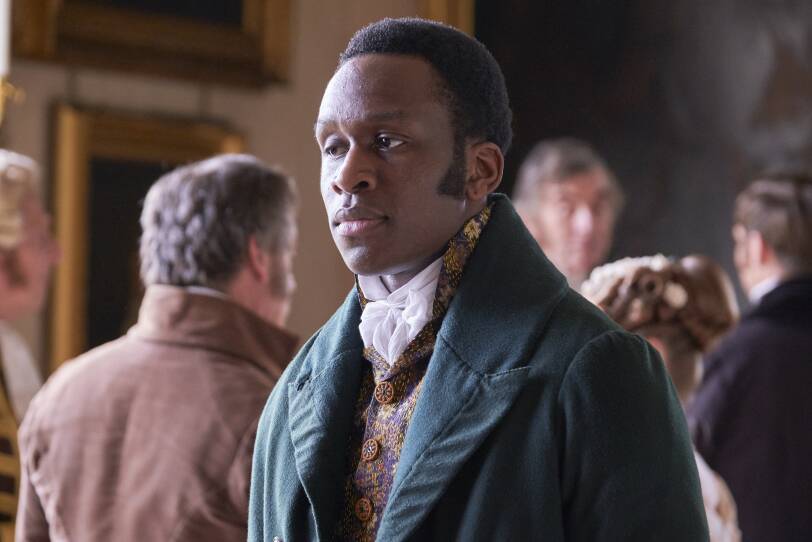The Confessions Of Frannie Langton is a new period drama on BritBox coming out just in time to fill the MASTERPIECE hiatus gap. The story takes place in 1826 London (after Sanditon but before the main action in The Long Song) with flashbacks to earlier in Jamaica. The four-part miniseries is a twisting mystery touching on the intersections of race, class, gender, and identity in late Regency England.
Frannie Langton (Karla Simone-Spence) is a lady's maid who stands accused of murdering her former employer Madame Benham (Sophie Cookson) and her husband George Benham (Stephen Campbell Moore). London society is convinced she killed her employers out of evil jealousy but the truth is far more complicated. Events in her past in Jamaica are connected to her employment for the Benhams. There’s also the fact that Frannie and Madame Benham had a romantic relationship.
Frannie is a queer Black woman at a time when there are multiple social and political barriers to being treated equally. She’s not without some form of community. During the course of the story, she meets fellow Black Londoners Sal (Amarah-Jae St Aubyn) and Olaudah “Laddie” Cambridge (Patrick Martins) who understand Frannie’s struggle for survival and justice but also have different perspectives on the society they live in.
In the miniseries, Karla-Simone Spence brings Frannie’s complexity from the novel pages to life on the screen. Spence is a rising star moving from UK independent productions Blue Story and Wannabe. In this GBH Drama exclusive, we spoke to Spence about the process of bringing Frannie’s complexity to life:
GBH Drama: How would you describe Frannie as a character for someone who's brand new to the story?
Karla-Simone Spence: Frannie is a young Jamaican woman who is incredibly smart, and incredibly witty, and she falls deeply in love with the mistress of the house that she's working in. She's accused at the beginning of the story of murdering her and her husband. She's trying to piece together what happened that night. Did she do it? She doesn't know, she can't quite remember. Frannie is a great character; a resilient woman who just really stands up for what she believes in, and she was a joy to play.
Were you a fan of either period dramas or mystery dramas before you auditioned for Frannie Langton?
I wouldn't say I was, to be honest. I haven't actually watched many period dramas. I always felt like I didn't really see myself represented in them and it started to feel a bit samey for me personally. When I got this script I was like, ‘Wow, this is a Jamaican woman in a period drama’ which is crazy and unheard of. When I read her on the page, she just really stood out to me and I really wanted to play her.
Were there any aspects of Frannie's experience that you could relate to as a modern woman of color in the UK?
Definitely. I think that's why I was so drawn to her being a Jamaican woman. I'm of Jamaican heritage myself, so [I was surprised to see a] Jamaican woman in a period drama. [I also relate to her] being a woman as well and going through the process of growing up in a society where you have obstacles. There are things that are put in place that make it quite harder for you to attain certain things in everyday life. I relate to that so much. She loved reading books and I loved reading books growing up as a kid.
Did you start filming with the end first, the beginning first, or somewhere in the middle?
We started somewhere in the middle. We filmed the end more towards the end. I felt like I did a lot of the sad scenes before I even got to the love scenes. So by the time I got to do the love scenes, it was like a breath of fresh air. I was like, "Finally I can be in the joyful moments of life with Frannie." Yeah, so we filmed kind of out of sequence.
What was the hardest aspect of filming? What was the toughest scene for you to film?
Oh, there were so many. Without giving spoilers away, I'd say it was the moments when she was at her lowest, where she was really going through it. She's dealing with her own trauma, she's dealing with loss, the loss of the love of her life, and also being accused of killing that woman. And just in the moments of true darkness for her, they were quite hard just to feel, but I felt like I owed it to her to really commit to that.
What was your working relationship like with Sophie Cookson (Madame Benham)?
Incredible. She was a joy to work with and really easy to work with. We really collaborated when it came to the love scenes because it was important for us to tell the story between them, to have a truthful, authentic portrayal of two women in love. Sometimes it can be over-sexualized and it can be quite dramatic and in a specific gaze. We wanted to show it was two women in love, a consensual love, and it's very natural, very comfortable, and very safe. We had an intimacy coordinator who helped us with that. [Their work is] so essential. I can't believe we never had one before in the industry.
Were there cast members that you didn't have a lot of time to work with and you wish you did?

I didn't have many scenes with Jodhi [May who plays Hep Elliot]. Jodhi was incredible. The scenes that I did get to do with her, it was just so captivating. I remember when we were doing the court scenes and she was giving her speech and I was just so in it. Our characters don't like each other at all, so playing against her was really compelling. I felt all these emotions rise up, which you get to see in the episode, which was nice. It's always nice being surprised by an actor and being surprised and how they make your character feel.
Were you surprised to find out that Frannie had a clash of opinions with both Olaudah and Sal at times? Did you expect that for her going into the script?


What I like about [Frannie] and what I like about [Olaudah and Sal] is they're all very different. These three black characters have completely different lives, and completely different perspectives and they're fully fleshed-out people. I wasn't surprised because I knew that Sara [Collins] was creating characters that were different, which was great. Frannie, she's had such a dark past, and a dark history, and she's been through so much that it's not a surprise that she has different views from someone who was raised in London. She grew up in Jamaica and she can be quite stubborn at times. So while she is butting heads with Olaudah, there are moments where she does agree with him, but she's not going to admit it. [Frannie] always wants to come out on top in the sense that she's not going to let him school her. She's educated and she's not going to let him run circles around her. She's going to run circles around him and it's kind of like that battle for intellect and power and status.
Frannie goes through a lot of trauma and strife. What was your self-care routine or your way to decompress at the end of the day?
In my trailer, I'd do a dance, just shake it off. Also when I went back to where I was staying, I would run a bath to take the load off. It was kind of like a ritual [where at the end] I'm Karla and I'm going to relax. This [process] was quite hard because when you're playing a character every day for three months, they don't really leave you, to be honest. They do stick with you. But [at the end of the day] I tried to unwind and shed her a little bit.
Did you pick up any historical skills in the process of playing Frannie?
I would like to say that I know how to light a fire with a flint, but I couldn't do it, so that was really hard. I don't think I picked up any new skills.
If you had to give Frannie some modern-day advice, what would you tell her?
Frannie, oh, I'd tell her so much. Without giving a spoiler, I think sometimes she should put herself first. Sometimes [in situations where you may end up choosing others], choose you.
What do you want black viewers in particular to take away from your portrayal of Frannie?
I guess to just feel represented, to see themselves in a period drama, to see a really fully fleshed out character who isn't a caricature, who is authentic and true and real and raw. She goes through an incredible journey and I got to play with so many different things with her. I just hope they get to enjoy seeing themselves in a period drama and hopefully enjoy the story also.
As a follow-up, what would you want queer viewers to take away from your portrayal of Frannie?
I'd want them to see that Frannie loves this woman deeply and she loves her for not only her physical features, she's beautiful, but also for her intellect. And it wasn't a relationship where she was taken advantage of because Madame is her employer. It was a consensual thing. And just to feel, I guess, see yourself represented in a period drama, a black woman who likes what she likes, and yeah, representation.
Are you currently working on any new projects?
I can't say. I'm very glad that I was able to do Frannie because it's made life a bit easier and I'm just happy to keep doing different kinds of work going forward.
All episodes of The Confessions Of Frannie Langton premiered on BritBox US on March 8th. Sanditon returns for season 3 on March 19, and Tom Jones premieres April 30. Previous seasons of Sanditon are here, and The Long Song is available here.




